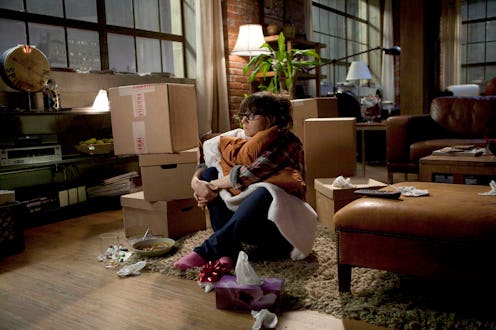
The most worst pain I have ever experienced was the one that came with a devastating breakup a few years ago. It may sound weird, but even the loss of my grandfather, whom I loved dearly and was very close to, was a far easier loss to handle than the one that came from being dumped by the man who broke my heart. I remember what it felt like to have to go into the world knowing that someone I loved deeply didn’t feel the same way. At times, it hurt so much that I wondered if my body was just going to give out and I would die. My heart was completely broken.
Little did I know that much of what I was feeling actually had a scientific explanation. From the very moment we start to fall in love, our brain is hard at work. It manipulates us, causing us to see things differently. It makes us feel high, confused, ecstatic, and even robs of us all sense of sanity. Because this is the case, it makes perfect sense that when a breakup happens, it’s once again our brain pushing all the buttons and creating, for lack of a better word, mayhem.
Here are six ways in which your brain will handle and respond to a breakup, should you (heaven forbid) find yourself in the middle of one.
YOU'll FEEL BETTER WHEN YOU LISTEN TO SAD MUSIC
A new study from Freie Universität Berlin has found what all of us sad sorts already knew: sad music can make a miserable person feel better after a breakup. The study of 772 participants discovered that listening to sad songs when you’re already feeling down actually acts as a cognitive reward for your brain. Those rewards include identifying with the song and empathizing with the singer, as well enjoying the escape from your thoughts as your mind wanders off to a place where “real-life” implications just don’t exist. (No wonder listening to “Maps,” by Yeah Yeah Yeahs got me through so many a breakup.)
you'll be (temporarily) dumber
Well, this is just the icing on the cake: A 2002 study from Case Western Reserve University in Ohio found that rejection can temporarily lower your IQ by 25 percent. The reason for this is that during a breakup, analytical thinking, decision-making abilities, and self control tend to go right out the door. Why else would you think it’s a good idea to drunk text your ex at 4 a.m. night after night, with both insults and promises to love them forever?
You'll feel actual PHYSICAL PAIN
While the term “heartbroken,” is the most commonly used word when it comes to experiencing a heartbreak, the reality is that your heart is not actually breaking. That said, the phrase comes from somewhere: those who are in the throes of such sadness often complain of an actual pain their chest.
A 2010 study performed at Rutgers University found that when the brains of recently dumped people were examined via an MRI while being shown photos of their ex, the emotions they felt triggered activity in the part of the brain responsible for physical pain. The study confirmed that rejection and physical pain are part of the same region, so according to your brain, the despair that comes with a breakup and the physical pain of an actual wound are the same thing.
...and you might get depressed
It’s one thing to say you're depressed, down in the dumps, and completely at a loss, as you lay on the couch unable to move or think about anything else. But when the feeling lasts? Well, that's called depression.
In 2013, a team of German scientists found that those who were still suffering from a breakup months afterward also suffer from clinical depression. Turns out that the decreased neurological activity in the cortexes of the brain of a heartbroken person, (the insula and the anterior and posterior cingulate, if you were curious), are the same decreases seen in someone who suffers from depression.
YOU'll actually never FORGET the PAIN
You know that saying, time heals? Well time might heal — but turns out it doesn't let you forget.
As Dr. Guy Winch explained to Psychology Today, while our brain allows us to forget physical pain, it's not so kind when it comes to emotional pain. When subjects are asked to recall the sadness and pain that comes with rejection or loss of love, all those feelings come immediately back, whereas memories of physical pain just disappear into the background.
you might have AN IDENTITY CRISIS
A 2010 study at Northwestern University found that after a breakup, the “sense of self ends.” Sounds horrifying, but it can actually be a way you begin to heal.
According to the lead author Erica Slotter, relationships change not only who we are, but how we feel about ourselves. Once that person leaves our lives, and we’re no longer a “we,” but an “I,” it can have a devastating effect on how we perceive ourselves. This might explain why people tend to change themselves after a breakup, either altering their appearance (hellooo drastic haircut) or even going so far as to switch their beliefs and values. They are trying to find out who they are again. And hey, maybe that's a good thing.
Images: FOX; Giphy(6)